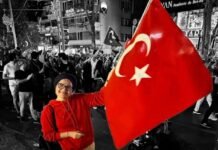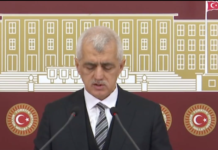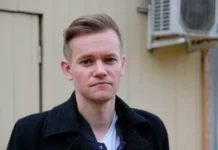French President Emmanuel Macron has criticised Turkish government under the rule of autocratic President Recep Tayyip Erdoğan over violations of press freedom and jailed journalists in Turkey ahead of an official visit of Erdoğan to Paris.
In a New Year address to the French media on Wednesday, Macron promised to raise the “situation of imprisoned journalists, prevented from doing their job” when Erdoğan visits the Elysée presidential palace on Friday.
According to a report by RFI, Macron said that “I will do it with respect by with the intention of defending, at the same time if I can put it that way, our values and interests.”
Macron has claimed credit for freeing French photojournalist Mathias Depardon and journalism student Loup Bureau, who were both detained last year while working in Turkey’s south-east, where the military is struggling the outlawed Kurdistan Workers’ Party (PKK).
RFI reported that Turkey’s clampdown on the press started even before the coup attempt and has seen newspapers and broadcasters closed and journalists prosecuted and imprisoned. Some 309 journalists have been arrested since the failed putsch, according to the TurkeyPurge website and the Free Journalists Initiative says that 165 are still behind bars spending trial. Most are accused of complicity with the coup plotters or helping “terrorist” organisations.
Erdoğan’s visit came under fire this week from the French Communist Party, which dubbed it an insult to the relations of three Kurdish activists murdered in Paris five years ago and to Turkish Kurds as a whole.
Macron had already promised to raise human rights with the Turkish president, although trade, the Syrian conflict and the status of Jerusalem also appear to be on the agenda.
Bianet has also reported that Macron has delivered a message on freedom of the press and underlined the liabilities of Turkey and Russia arising from European Convention on Human Rights (ECHR). He has also stated that he is going to discuss freedom of the press and imprisoned journalists in the meeting he will hold with Erdoğan on Friday.
Coming together with journalists in Paris, Macron has reportedly stated that “Freedom of the press is not being damaged in dictatorships only but also in some democratic European states as well… I will bring the condition of imprisoned journalists in Turkey to the agenda again.”
Meanwhile, Turkish Presidential Spokesperson İbrahim Kalın claimed at a press conference on Friday that Macron’s remarks are based on a “lack of information,” if not “prejudice.” Kalın said Erdoğan will present documents to Macron showing that those journalists are being prosecuted “not because of journalistic activities.”
“Those who try to cast shadow on Turkey’s fight against terrorism through the rhetoric on freedom of expression should better understand the realities of Turkey,” he added.
Kalın has also cried foul regarding French criticism, noting that the French government declared a state of emergency after terror attacks in Paris and Nice. “We are aware of the kind of measures that you have taken. We know how people who underestimated the attacks or expressed their views on them were arrested and taken to court,” he said. Kalın has claimed that Turkish government has been involved in a struggle against three different terrorist organizations, bemoaning the “double standards” of Ankara’s “European friends.”
On the issue of jailed journalists, the presidential spokesman has claimed that the government cannot intervene to the judiciary and alleged “the fact that a person is a journalist does not necessarily mean they are innocent and cannot commit a crime.”
Turkey is the biggest jailer of journalists in the world. The most recent figures documented by the SCF has showed that 242 journalists and media workers are in jails as of December 30, 2017, most in pre-trial detention languishing in notorious Turkish prisons without even a conviction. Of those in Turkish prisons, 215 are arrested pending trial, only 27 journalists remain convicted and serving time in Turkish prisons. An outstanding detention warrants remain for 138 journalists who live in exile or remain at large in Turkey.
Detaining tens of thousands of people over alleged links to the Gülen movement, the government also closed down more than 180 media outlets after the controversial coup attempt.
Meanwhile, Emma Sinclair-Webb, Turkey Director of Human Rights Watch (HRW) has urged France’s Macron to focus on the human rights and democracy crisis in Turkey, arbitrary arrests, erosion of rule of law, political control of courts, crackdown on media, civil society and jailed Kurdish parliamentary opposition during his meeting with Erdoğan.
Sinclair-Webb tweeted on Thursday that “In meeting with Turkey’s President tomorrow @EmmanuelMacron should focus on the human rights and democracy crisis in Turkey, arbitrary arrests, erosion of rule of law, political control of courts, crackdown on media, civil society, & jailed Kurdish parliamentary opposition.”
She has continued to say that “In tomorrow’s meeting @EmmanuelMacron should tell Pres(ident) Erdoğan it is deeply damaging to Turkey’s democracy to jail leaders and MPs of an opposition party which received millions of votes in the last election.”
Turkey has stepped up its crackdown on Kurdish politicians since 2016. Trustees have been appointed to dozens of municipalities in the country’s predominantly Kurdish Southeast, while hundreds of local Kurdish politicians have been arrested on terror charges.
Nine HDP deputies including Co-chairperson Selahattin Demirtaş and former chairperson Figen Yüksekdağ are still in prison. Moreover, a total of 27 HDP deputies were detained and released by Turkish government after Nov. 4, 2016 over alleged links to the outlawed PKK.
Macron will meet Erdoğan in Paris on Friday to discuss bilateral relations as well as the Middle East issues, according to French president’s office. “The meeting, which follows the regular conversations of recent months, will be an opportunity to discuss issues related to bilateral relations between our two countries, as well as regional issues including a particular focus on the Syrian file” and the Palestinian one, Macron’s office said in a statement. “The issue of human rights will also be discussed.”
Erdoğan is meeting Macron for the first time in Paris since the French election in May 2017. Bloomberg reported that Macron in a phone call earlier this month asked Erdoğan to tone down his reaction to the US decision to recognize Jerusalem as the capital of Israel. The Turkish president has threatened to cut newly restored ties with Israel over the decision. In May, both presidents agreed to work together on terrorism in all its forms at a meeting in Brussels.
Concerning Erdoğan’s visit to Paris, his spokesperson İbrahim Kalın said that “Regional issues such as Jerusalem, Syria, Iraq and fight against terrorism, and Turkey-EU relations will be addressed in the meeting. President’s visit will serve the benefit of all region with our mutual cooperation with France.”
Turkey survived a controversial military coup attempt on July 15, 2016 that killed 249 people. Immediately after the putsch, the Justice and Development Party (AKP) government along with President Erdoğan pinned the blame on the Gülen movement.
Gülen, who inspired the movement, strongly denied having any role in the failed coup and called for an international investigation into it, but President Erdoğan — calling the coup attempt “a gift from God” — and the government initiated a widespread purge aimed at cleansing sympathizers of the movement from within state institutions, dehumanizing its popular figures and putting them in custody.
Turkey has suspended or dismissed more than 150,000 judges, teachers, police and civil servants since July 15. Turkey’s Interior Minister announced on December 12, 2017 that 55,665 people have been arrested. Previously, on December 13, 2017, The Justice Ministry announced that 169,013 people have been the subject of legal proceedings on coup charges since the failed coup.















